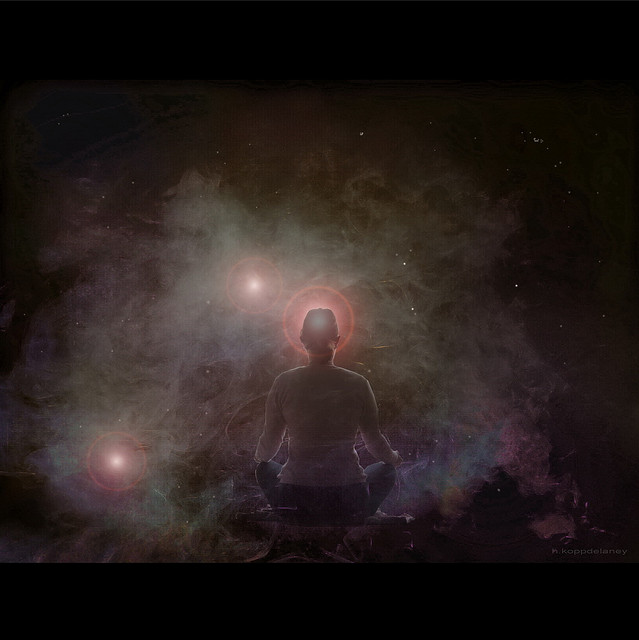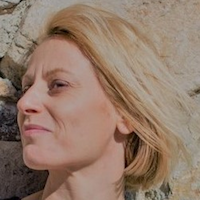
If I look back some 15 years, intuition didn’t play a part in my life.
I was living in the Middle East, working as a journalist at a reputed international daily newspaper. I spent my nights glued to my desk, relating the harsh facts, editing in-depth opinion pieces and political analyses, and telling the stories of a bloody and volatile region in the grips of a complex crisis.
Looking back even further, I realized I had never really tapped into my intuition. Born into a British military family, I was raised on logical, disciplined order. I was well-schooled, well-travelled, university-educated, and set on a promising career path.
Psychic seeing? Not a chance! Higher intelligence? Not here.
And yet, here it was.
In the midst of my professional striving was a niggling grain of truth: I was ignoring a vital part of myself, a different perspective—my intuition. I came to feel I was leaving completely undeveloped a faculty that went beyond academic skill or professional accolades—one that was deep, profound, and meaningful.
So, I started to explore. At first, my moves were small and secretive, away from the eyes of contemporaries who may have written me off as “unbalanced” or as a “deranged New Ager,” with some yoga, aromatherapy, and Thai massage.
Then I moved deeper and more intrepidly into Ayurveda, Reiki, and meditation—until finally, I dived into an all-out immersion filled with in-depth energy-healing trainings, extensive periods of meditation, prolonged ashram stays, psychic development, and esoteric rituals.
I threw myself in with my whole heart, but also sadly with the misguided enthusiasm of a child at a county fair.
My thirst for the ancient wisdom knew no bounds; however, my psychological resilience did, and I was driven to the very real and frightening brink of breakdown and madness.
This is why these six steps that I offer will help lead you to a “smart” intuition.
They are intended as guiding lights to a grounded, solid, and real intuition for those who find themselves (as I did) seeking something deeper in a world where the obsession with intellect has become so distorted. In our world, intelligence is king. From a young age, we’re trained for exams and qualifications, intrinsically linking a sense of self-worth to academic results and outer achievements. As we grow older, we join a society that worships so-called “experts”—academics and intellectuals with letters after their names and books on their shelves.
Of course, I’m not saying intelligence is a bad thing or that a cultured education is wrong—the mind should be trained, sharpened, and informed. However, we have over-developed the intellect to such an extent that it has become detrimental to our very evolution. This is true particularly in the West, although the trend is pretty much global these days.
We’ve outsmarted ourselves.
In the proficiency of our mental aptitude, we have become disconnected from our inner-knowing, disconnected from true wisdom, disconnected from the seriousness of this skill, and sometimes, disconnected from the very memory of how to tap into it in a safe way.
This short guide is the accumulated knowledge of my own two decades of study and experience—both good and bad—and also based strongly on the teachings of a master whose wisdom I have discovered to hold what I have come to appreciate as the purest, strongest, safest vibration of light, Omraam Mikhael Aivanhov.
He is a great teacher, philosopher, and mystic—little known to the English-speaking world, but well-followed in his homeland of Bulgaria, and in France, where he came to settle and lived until his death in 1986.
Far from the buzz of a newsroom, I now work with a different kind of buzz as an energy intuitive and healer, and his teachings have become my anchoring and guiding light. It is he who once said:
“Those who work with the intellect can achieve a certain level of understanding, but it barely grazes the surface of this world of intuition, in which knowledge is instantaneous and total. It takes them years of research, reflection, and calculation to make their discoveries. Those who have chosen the way of the spirit, however, given of course they have reached a state of inner harmony, can tune in directly to the sublime regions. Intuition, therefore, is superior to the intellect.”
Those seeking to refine this skill aim to develop the more subtle senses—the senses that enable us to touch a realm of ancient wisdom of the universal mind, the soul’s eternal voice, and the truth. This is what we call intuition. And no, you are not “unbalanced” or “deranged” for your calling to go there.
Without further ado, here are my six steps to finding and honing a smart intuition:
1. Purification
This is the step in which all the other steps are contained. To access the high realms of pure intuition, we must raise our vibrational frequency so that it is in alignment with the truth of the spiritual world. The density of our consciousness must be offered for purification—old thought patterns and behavioral conditioning, outdated emotional patterns and holdings, and physical toxicity.
As an energy healer, I work with this purification process, and I’ve found that these days the “spiritual intensity” of the planet herself is increasing. This is spiritual groundwork; it’s gritty and grueling, it can seem never-ending, and it’s often not pretty—but the results are incredible.
2. Meditation
Meditation, if done correctly, purifies the mind. In focused meditation, we put the intellect to its right and proper use: vigilance and observation. In meditation, the aim is to train the intellect to watch the thoughts running through the mind, to discern which are beneficial, constructive, and to be amplified, and which are negative, critical, and to be eliminated.
Like a bouncer at the doors of our own inner nightclub, this is where the intellect serves its greatest purpose.
3. Aura
The aura is like the embryonic fluid of the soul, if you can imagine a substance that is invisible yet mercurial, a protective and nourishing envelope through which messages are exchanged between the sublime realms and our physical plane. It is a highly volatile flash like quicksilver, reflecting the flick of a thought or the smallest quiver of emotion in vivid color. It is important to keep the aura as luminous as possible, to pick up the highest messages. There are many ways to work on the aura—through emotional awareness, through sound, or use of color.
4. Silence
Connecting to the wellspring of intuitive knowledge begins with finding both an inner and outer silence. Simple to say, yet difficult to do, as in many people’s realities; the outer world is chaotic, and the inner world equally so.
In the roar of this ocean, how is it possible to find the subtle thermals that will carry us to spiritual truths?
On a daily basis, try making space for silence, and from that silence, transmit the questions you have, high, high up. Waiting in silence, an answer will eventually come. It may be confusing or unclear at first, but as you grow in the comfort of silence, the messages will become clearer, easier to interpret, and signaling you are on the right way.
5. Ground
This I tell you from bitter and painful experience. To roam high in the spiritual domain, it is imperative to first have mastered anchoring our physical bodies to the earthly plane. If not, we could find ourselves adrift in the psychic realms, without proper protection or proper guidance. The very best way to ground is to take your time, spend time in nature, connect to the nature spirits, and call in their assistance in your grounding.
6. Patience
It may not be the sexiest of qualities, but the greatest virtue of the spiritual disciple is patience. There are no fast answers or quick fixes. Developing proper grounded intuitive skills, and rediscovering your innate powers to heal, comes from long and consistent practice, perseverance, and faith. Intuition is an inherent gift; it cannot be learned or imposed from an external source.
It reveals itself in the most wondrous ways, as we continue step-by-step on our own journey.
~
~
Author: Jill Cartwright
Image: Flickr/Hartwig HKD
Editor: Callie Rushton











Read 19 comments and reply